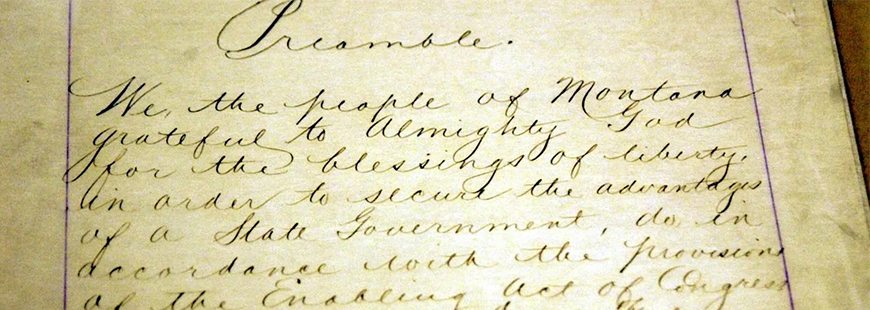IX.5 Severance Tax on Coal - Trust Fund
History
Sources
Drafting
Ratification
1976 Voter Information PamphletVoter Information for Proposed Constitutional Amendments, Referendums, and Initiatives, General Election, November 2, 1976. Prepared by Frank Murray, Secretary of State. Accessed at:https://archive.org/stream/voterinformation1976montrich#page/n0/mode/2up
General Election Ballot, November 2, 1976
Introduction
In 1976 the citizens of Montana were called upon to vote on an amendment to the Montana Constitution to creating a trust funded by revenue received from the state coal severance tax. Income for the trust fund would be generated from one-fourth of the money received from the coal severance tax until 1980. After 1980 the income and interest for the fund would be generated from one-half of the revenue from the coal severance tax. Income and interest from the trust could be used to benefit the citizens of Montana with a majority legislative vote. The amendment also stipulated that the principal of the trust could only be spent by three-fourths legislative vote. The intent of the amendment was to create a safeguard for future generations of Montana citizens in the event that coal resources ran out or were no longer marketable. The amendment as proposed to voters of the state was written as follows:Id. at 1.
AN ACT TO SUBMIT TO THE QUALIFIED ELECTORS OF MONTANA AN AMENDMENT TO THE CONSTITUTION TO REQUIRE THE LEGISLATURE TO DEDICATE A PORTION OF THE COAL SEVERANCE TAX TO A PERMANENT TRUST FUND.
BE IT ENACTED BY THE LEGISLATURE OF THE STATE OF MONTANA: Section 1. Article IX of the Montana constitution is amended by adding a new section 5 that reads as follows: Section 5. Severance tax on coal -- trust fund. The legislature shall dedicate not less than one-fourth (1/4) of the coal severance tax to a trust fund, the interest and incomes from which may be appropriated. The principal of the trust shall forever remain inviolate unless appropriated by vote of three-fourths (3/4) of the members of each house of the legislature. After December 31, 1979, at least fifty percent (50%) of the severance tax shall be dedicated to the trust fund.
For a permanent trust fund from coal taxes
Against a permanent trust fund from coal taxes
Arguments for approval and against approval.
Arguments advocating for approval and those arguing against for the proposed amendment were provided to the citizens of the state to help inform voter decision. Rebuttals to each of the arguments were also provided in the 1976 Voter Information Pamphlet.
Thomas Towe, Chet Blaylock, and John Driscoll provided an argument advocating for the approval of the amendment. In their argument, they estimated that Montana had coal reserves of 108 billion tons. This was recognized as a valuable, irreplaceable resource. They argued that Montana had previously improperly managed revenue from the State's rich Copper mining legacy and had relatively little to show for it. In addition, they argued that other areas of the country had mismanaged revenue from coal resources and also had relatively little to show for it. As a result, they proposed the development of a permanent trust fund to manage revenue from Montana's coal reserves. This was intended to create an avenue to benefit future Montana generations with revenue derived from coal mining that would be in place should the coal no longer exist or have value. They described the amendment as a forward looking proposal intended to allow future generations in Montana to share in the riches derived coal mining in the 1970s.Id. at 2.
Dan Yardley, Harold C. Nelson, and Francis Bardanouve provided an argument advocating for the rejection of the measure. In their argument they estimated that the value of the trust would exceed hundreds of millions of dollars in a relatively short period of time. They also opined that investment of funds should fall within the private sector. They portrayed concern, that due to the large value of the trust, there was potential for corruption or mismanagement of the revenues by the legislature. In addition, they suggested that the proposed trust fund would be redundant since the state had previously approved a measure in 1974 which created a resource indemnity trust funded by the gross tax of all minerals which included coal.Id. at 4.
Dan Yardley and Francis Bardanouve also provided an argument rebutting Towe, Blaylock, and Driscoll's argument advocating for approval of the measure. In their rebuttal, Yardley and Bardanouve indicated that revenue from the coal severance tax was currently being utilized to develop local areas which had sustained increased tax costs due to coal development. The revenue had been allotted to help communities that had sustained increases in expenditures resulting directly or indirectly from coal use or mining. They cited highway improvement, creating community parks, improving the public school system, and county level planning as tangible benefits being realized at the time this measure was brought forth. They argue that the wide range of uses for severance tax revenue used at the time adequately provided benefit to the citizens of the State without creating a multimillion dollar trust fund. Yardley and Bardanouve considered the amendment unnecessary at the time.Id. at 4-5.
Chet Blaylock, Thomas Towe, and John Driscoll provided an argument rebutting the argument advocating rejection of the measure. In there argument, they conceded that the constitutional amendment would establish a second trust in the State of Montana related to coal and mineral extraction, but indicated that it was needed to benefit future generations. They countered the argument that the trust fund would foster political corruption by stating that a three-quarter vote by each house of the legislature would be required to access the principal of the trust which they recognized was "extremely difficult to achieve without proving a compelling necessity."Id. at 5.
Conclusion
The citizens of the state approved the measure by a vote of 178,773 to 103,001 on the 2nd of November 1976.http://sos.mt.gov/Elections/forms/history/constitutionalmeasureslist2010.pdf
